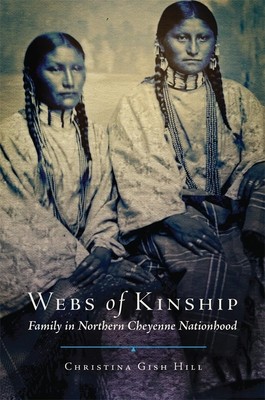
- We will send in 10–14 business days.
- Author: Christina Gish Hill
- Publisher: University of Oklahoma Press
- ISBN-10: 0806156015
- ISBN-13: 9780806156019
- Format: 16 x 22.9 x 3.3 cm, hardcover
- Language: English
- SAVE -10% with code: EXTRA
Reviews
Description
Many stories that non-Natives tell about Native people emphasize human suffering, the inevitability of loss, and eventual extinction, whether physical or cultural. But the stories Northern Cheyennes tell about themselves emphasize survival, connectedness, and commitment to land and community. In writing Webs of Kinship, anthropologist Christina Gish Hill has worked with government records and other historical documents, as well as the oral testimonies of today's Northern Cheyennes, to emphasize the ties of family, rather than the ambitions of individual leaders, as the central impetus behind the nation's efforts to establish a reservation in its Tongue River homeland. Hill focuses on the people who lived alongside notable Cheyennes such as Dull Knife, Little Wolf, Little Chief, and Two Moons to reveal the central role of kinship in the Cheyennes' navigation of U.S. colonial policy during removal and the early reservation period. As one of Hill's Cheyenne correspondents reminded her, Dull Knife had a family, just as all of us do. He and other Cheyenne leaders made decisions with their entire extended families in mind--not just those living, but those who came before and those yet to be born. Webs of Kinship demonstrates that the Cheyennes used kinship ties strategically to secure resources, escape the U.S. military, and establish alliances that in turn aided their efforts to remain a nation in their northern homeland. By reexamining the most tumultuous moments of Northern Cheyenne removal, this book illustrates how the power of kinship has safeguarded the nation's political autonomy even in the face of U.S. encroachment, allowing the Cheyennes to shape their own story.
EXTRA 10 % discount with code: EXTRA
The promotion ends in 17d.10:37:28
The discount code is valid when purchasing from 10 €. Discounts do not stack.
- Author: Christina Gish Hill
- Publisher: University of Oklahoma Press
- ISBN-10: 0806156015
- ISBN-13: 9780806156019
- Format: 16 x 22.9 x 3.3 cm, hardcover
- Language: English English
Many stories that non-Natives tell about Native people emphasize human suffering, the inevitability of loss, and eventual extinction, whether physical or cultural. But the stories Northern Cheyennes tell about themselves emphasize survival, connectedness, and commitment to land and community. In writing Webs of Kinship, anthropologist Christina Gish Hill has worked with government records and other historical documents, as well as the oral testimonies of today's Northern Cheyennes, to emphasize the ties of family, rather than the ambitions of individual leaders, as the central impetus behind the nation's efforts to establish a reservation in its Tongue River homeland. Hill focuses on the people who lived alongside notable Cheyennes such as Dull Knife, Little Wolf, Little Chief, and Two Moons to reveal the central role of kinship in the Cheyennes' navigation of U.S. colonial policy during removal and the early reservation period. As one of Hill's Cheyenne correspondents reminded her, Dull Knife had a family, just as all of us do. He and other Cheyenne leaders made decisions with their entire extended families in mind--not just those living, but those who came before and those yet to be born. Webs of Kinship demonstrates that the Cheyennes used kinship ties strategically to secure resources, escape the U.S. military, and establish alliances that in turn aided their efforts to remain a nation in their northern homeland. By reexamining the most tumultuous moments of Northern Cheyenne removal, this book illustrates how the power of kinship has safeguarded the nation's political autonomy even in the face of U.S. encroachment, allowing the Cheyennes to shape their own story.


Reviews